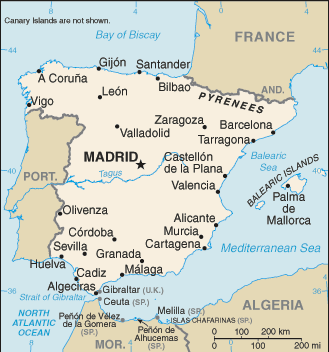 Spain's restive northeastern region of Catalonia and especially its freewheeling capital Barcelona have over the past years come to rival the Netherlands and and Amsterdam as a European cannabis hub. Smokers' clubs have proliferated, tolerated (and regulated) by the authroities. Now the regional government, the Generalitat de Catalunya, has passed a measure formally legalizing the clubs.
Spain's restive northeastern region of Catalonia and especially its freewheeling capital Barcelona have over the past years come to rival the Netherlands and and Amsterdam as a European cannabis hub. Smokers' clubs have proliferated, tolerated (and regulated) by the authroities. Now the regional government, the Generalitat de Catalunya, has passed a measure formally legalizing the clubs.
Members of registered Cannabis Social Clubs will now be free to cultivate, distribute and consume the herb. Under the law passed by the regional parliament June 20, clubs will be permitted to grow enough to supply their members—60 grams per month for adults 21 and over, and 20 grams per month for those between 18 and 21.
The Cannabis Associations Law (Ley de Asociaciones Cánnabicas) was passed following a long activist campaign. La Rosa Verda (Green Rose) network garnered some 67,500 signatures—well over the 50,000 needed to force parliament to take up the measure under Catalan law. Architects of Uruguay's legalization law were brought in to testify. The measure passed overwhelmingly—by a vote of 118 to nine.
This is an open challenge to authorities in Spain's capital Madrid. Catalonia is the third of Spain's 17 regional governments to approve such a law, following similar recent measures in Navarra and the Basque Country, also in the northaest. Spain's conservative Prime Minister Mariano Rajoy has already pledged to challenge the Basque Country legalization measure before the country's high court, the Constitutional Tribunal. The Catalan law may face a similar challenge.
Spanish national law is actually ambiguous on the cannabis cultivation quesiton. A draconian "Citizen Safety Law" passed two years ago tightened up the country's decriminalization policy—as well as imposing harsh restrictions on public protest. But the fine print seemed to permit cultivation behind closed doors, as the law's cannabis restrictions are only to be applied "in visible public places."
And a show-down between Catalonia and Madrid was brewing anyway. At a public rally in Barcelona's National Theatre on July 4, Catalonia's regional president Carles Puigdemont announced plans to hold a popular referendum on independence from Spain on Oct. 1. As an independence movement has mounted over the past decade, Madrid has refused to recognize Catalonia's right to secede. Three days after Puigdemont's announcement, the Constitutional Tribunal ruled that Catalonia may spend no public funds to hold the referendum.
The independence push was fueled partly by the Constitutional Tribunal's previous rejection of parts of a new statute that would have granted Catalonia more autonomy. The Economist writes that "the main drivers were nationalist politicians in Barcelona who blamed euro-crisis austerity on Madrid." But it isn't all about economics. Catalonia has its own distinct language and culture, and sensibilites there are increasingly more liberal than in Madrid. Cannabis is now clearly one of the issues dividing the region from Spain's national government.
Cross-post to High Times
Graphic: Perry-Castañeda Library Map Collection







Recent comments
3 weeks 2 hours ago
3 weeks 9 hours ago
6 weeks 1 day ago
7 weeks 9 hours ago
11 weeks 16 hours ago
14 weeks 6 days ago
18 weeks 6 days ago
19 weeks 4 days ago
29 weeks 4 days ago
33 weeks 5 days ago